|
|
 |
|
Calanoida ( Order ) |
|
|
|
Clausocalanoidea ( Superfamily ) |
|
|
|
Euchaetidae ( Family ) |
|
|
|
Euchaeta ( Genus ) |
|
|
| |
Euchaeta tenuis Esterly, 1906 (F,M) | |
| | | | | | | Syn.: | E. solida Esterly, 1911 (p.324, figs.M)); Sewell, 1948 (p.556, 563);
Pareuchaeta solida : Brodsky, 1950 (1967) (p.221, figs.M); ? Tanaka & Omori, 1968 (p.255, figs.M);
Paraeuchaeta tenuis : Bradford & al., 1983 (p.23); in CalCOFI regional list (MDO, Nov. 2013; M. Ohman, comm. pers.);
Pareuchaeta tenuis : Heinrich, 1990 (p.17) | | | | Ref.: | | | Esterly, 1906 a (p.61, Descr.F, figs.F); A. Scott, 1909 (p.68, figs.F); Sewell, 1929 (p.133, 149, figs.F,M, juv., Rem.); 1947 (p.117); Brodsky, 1950 (1967) (p.202, figs.F, Rem.); Vervoort, 1957 (p.78); Grice, 1962 (p.201, figs.F,M); Tanaka, 1973 (p.138, figs.F,M); Chen & Shen, 1974 (p.129, figs.F); Park, 1995 (p.25, Redescr.F,M, figs.F,M) | 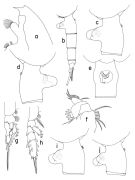 issued from : T. Park in Bull. Scripps Inst. Oceanogr. Univ. California, San Diego, 1995, 29. [p.125, Fig.15]. Female (from the eastern Pacific): a, forehead (left side); b, urosome (left); c, d, e, genital somite (left, right, ventral, respectively); f, Mx1 (first inner lobe omitted); g, P1 (anterior); h, P2 (anterior). Female (from the central equatorial Pacific): i, genital somite (left); Female (from the East China Sea): j, genital somite (left).
|
 issued from : T. Park in Bull. Scripps Inst. Oceanogr. Univ. California, San Diego, 1995, 29. [p.126, Fig.16]. Male (from off the west coast of South America): a, forehead (left side); b, P1(anterior); c, P2 (anterior); d, exopod of left 5th leg (anterior); e, idem (anterior, tilted clockwise); f, idem (medial, tilted clockwise)
|
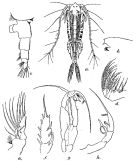 issued from : R.B.S. Sewell in Mem. Indian Mus., 1929, X. [p.150, Fig.58]. Bemale (from off SE Sri-Lanka): a, habitus (dorsal); b, forehead (lateral); c, urosome (lateral left side); d, Mx2; e, P1; f, P2 (exopodal segments 2 and 3). Male: g, P5; h, left P5.
|
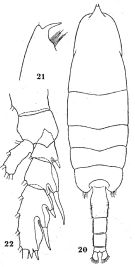 issued from : Q.-c Chen & C.-j. Shen in Studia Marina Sinica, 1974, 9. [p.129, Figs.20-22]. Female: 20, habitus (dorsal); 21, forehead (lateral); 22, P2.
|
 issued from : A. Scott in Siboga-Expedition, 1909, XIX a. [Plate XIX, Figs.1-8]. Female (from Indonesia-Malaysia): 1, habitus (dorsal); 2, forehead (lateral); 3, last thoracic and genital segments (left side); 4, A1; 5, Mxp (one of the distal hairs); 6, P1; 7, P2; 8, part of terminal spine of exopodite of P3.
|
 issued from : C.O. Esterly in Univ. Calif. Publs Zool., 1911, 6 (14). [Pl.26, Fig.2]. As Euchaeta solida. Male (from San Diego Region): 2, habitus (lateral).
|
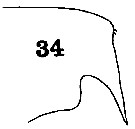 issued from : C.O. Esterly in Univ. Calif. Publs Zool., 1911, 6 (14). [Pl.28, Fig.34]. As Euchaeta solida. Male: 34, forehead (lateral).
|
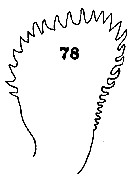 issued from : C.O. Esterly in Univ. Calif. Publs Zool., 1911, 6 (14). [Pl.30, Fig.78]. As Euchaeta solida. Male: 78, toothed process on the 2nd segment ot the exopod of the left P5.
|
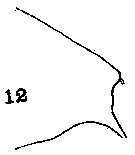 issued from : C.O. Esterly in Univ. Calif. Publs Zool., 1906, 3 (5). [Pl.9, Fig.12]. Female (from San Diego, California): 12, forehead (lateral).
|
 issued from : C.O. Esterly in Univ. Calif. Publs Zool., 1906, 3 (5). [Pl.10, Figs.29, 31]. Female: 29, last thoracic segment and genital segment (lateral), 31, genital segment (ventral).
|
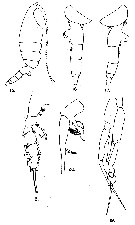 issued from : G.D. Grice in Fish. Bull. Fish and Wildl. Ser., 1962, 61. [p.200, Pl.13, Figs.15-20]. Female (from equatorial Pacific): 15, habitus (lateral); 16, posterior part of thorax and urosome (lateral, left side); 17, same (right side); 18, P2. Nota: Large and asymmetrical ventral protrusions genital segment. Male: 19, P5; 20, terminal part of left P5.
|
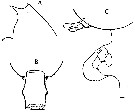 issued from : O. Tanaka in I O B C Handbook, 1973, IV. [p.139, Fig.7, A-C]. Female (from Bay of Bengal): A, forehead (lateral); B, genital segment (dorsal); C, last thoracic segment and genital segment (lateral, left side).
|
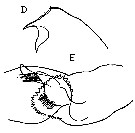 issued from : O. Tanaka in I O B C Handbook, 1973, IV. [p.139, Fig.8, D-E]. Male: D, forehead (lateral); E, distal segment of left P5.
|
 issued from : O. Tanaka in I O B C Handbook, 1973, IV. [p.138, Fig.9: 8]. Female: 8, 2nd outer marginal spine of exopod 3 of P2. Nota: This spine is long, reaching to midway between the base of the spine and that of the distal spine.
|
 Euchaeta tenuis Euchaeta tenuis Female: 1 - See Key to acuta species Group. 2 - Dorsally, genital somite nearly symmetrical. 3 - Laterally, rostrum slender (Fig.15-a). Genital flange not spiniform (Fig.15-b). 4 - Right genital flange much larger than left (Fig.15-c).
| | | | | Compl. Ref.: | | | Sewell, 1948 (p.329, 348, 530, 531, 534, 539, 540, 541, 542, 552, 556, 562); Fleminger, 1967 a (tabl.1); Timonin, 1971 (p.281, trophic group); Patel, 1975 (p.659); Tranter, 1977 (p.596); Sreekumaran Nair & al., 1981 (p.493), Guangshan & Honglin, 1984 (p.118, tab.); Longhurst, 1985 (tab.2); Madhupratap & Haridas, 1986 (p.105, tab.1); Sarkar & al., 1986 (p.178); Hattori, 1991 (tab.1, Appendix); Shih & Young, 1995 (p.70); Prusova & Smith, 2005 (p.77); Morales-Ramirez & Suarez-Morales, 2008 (p.520) | | | | NZ: | 8 | | |
|
Distribution map of Euchaeta tenuis by geographical zones
|
| | | | | | | | | | Loc: | | | G. of Aden, Arabian Sea, Maldive Is., Indian, off E Sri Lanka, India (E, Saurashtra coast, Hooghly estuary), Bay of Bengal, W Australia, Indonesia-Malaysia, China Seas (East China Sea, South China Sea), off Japan, off Sanriku, California, off W Guatemala, W Costa Rica, Pacif. (W equatorial), Pacif. (equatorial), E Pacif. (tropical N-S), N Chile | | | | N: | 26 | | | | Lg.: | | | (3) F: 6,1-5,3; M: 5,1-4,68; (5) F: 6,8; (17) F: 6; (22) F: 6,8-6; M: 5,22; (29) F: 4,9; (98) F: 6,28-4,7; M: 5,63-5,35; (101) F: 5,98-5,13; M: 4,75-5,22; {F: 4,70-6,80; M: 4,68-5,63}
The mean female size is 5.817 mm (n = 11; SD = 0.7175), and the mean male size is 5.136 mm (n = 7; SD = 0.3222). The size ratio (male : female) is 0.918 (n = 3; SD = 0.0734) or ± 92 %. | | | | Rem.: | mesopelagic.
After Tanaka (1973, p.138) the species is very closely allied to Euchaeta spinosa Giesbrecht, but is easily distinguished from the latter by the shape of the rostrum and genital boss when viewed from the lateral. In the former the outer marginal spine on the 3rd segment of the exopod of the P2 does not reach the base of the 3rd spine on the same segment.
For Park (1995, p.22) this species belongs to ‘’acuta ’’ Group.
Timonin (1971, p.282) considers the trophic interrelations in the equatorial and tropical Indian Ocean, and divides the plankters into 6 trophic groups from the litterature and the results of studies of mouth-parts structure and intestine content. This species is a seizing and masticating carnivorous.
Park (1995, p.26) found this species along the west coast of America between 29°N and 24°S, in equatorial waters of the whole Pacific between 0° and 11°S, the western Pacific including the Malay Archipelago, The East and South China seas, and waters off Japan between 35°N and 14°S, and the Indian Ocean between 5°N and 21°S. | | | Last update : 26/08/2019 | |
|
|
 Any use of this site for a publication will be mentioned with the following reference : Any use of this site for a publication will be mentioned with the following reference :
Razouls C., Desreumaux N., Kouwenberg J. and de Bovée F., 2005-2026. - Biodiversity of Marine Planktonic Copepods (morphology, geographical distribution and biological data). Sorbonne University, CNRS. Available at http://copepodes.obs-banyuls.fr/en [Accessed February 02, 2026] © copyright 2005-2026 Sorbonne University, CNRS
|
|
 |
 |
















